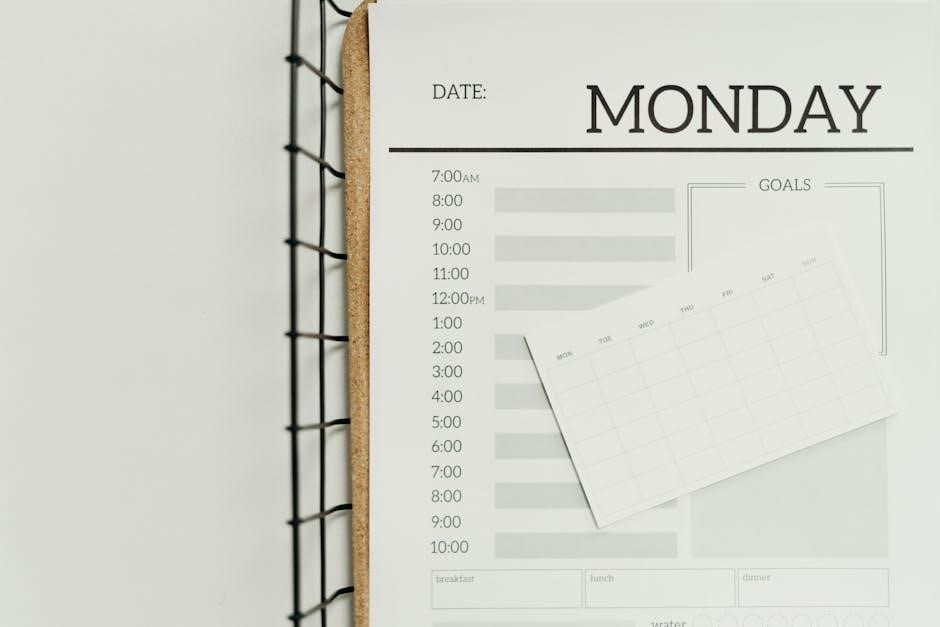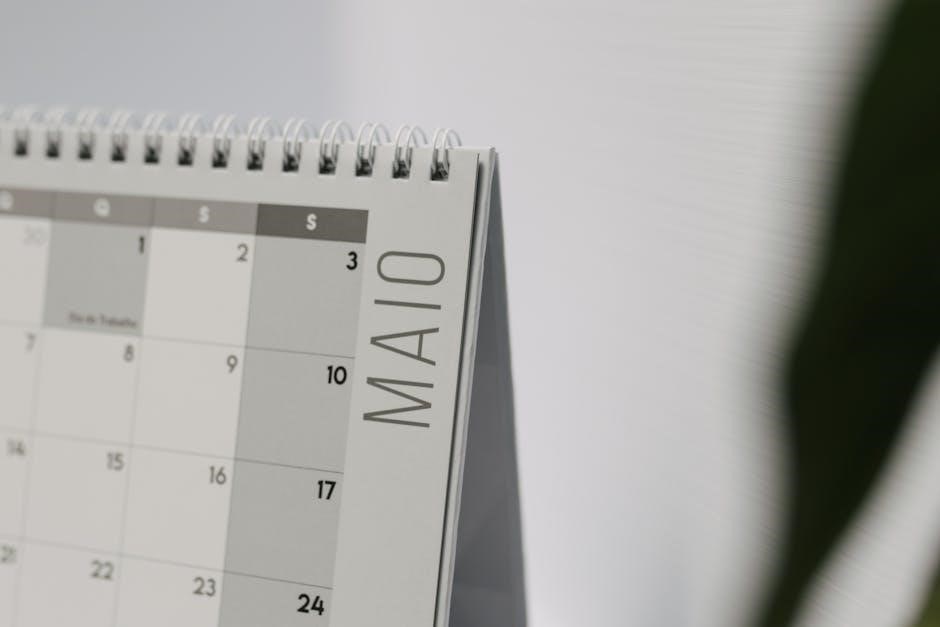Proper nutrition is crucial for marathon performance, ensuring optimal energy levels and recovery. A well-structured meal plan helps athletes fuel their training and peak on race day. This guide offers expert-backed strategies and practical tips to customize your diet, balancing carbs, proteins, and hydration for peak performance. Learn how to optimize your meals in the week leading up to the marathon and feel your best when it matters most.
Overview of Nutritional Importance
Nutrition plays a vital role in marathon preparation, directly impacting energy levels, recovery, and overall performance. A balanced diet ensures proper fueling, reducing the risk of fatigue and injury. Carbohydrates are essential for energy storage, while proteins support muscle repair. Hydration is critical to maintain bodily functions and prevent dehydration. Electrolytes help regulate fluid balance, and fiber aids digestion. A well-planned meal strategy tailored to individual needs optimizes physiological and mental readiness, ensuring peak performance on race day. Proper nutrition not only enhances endurance but also supports recovery, making it a cornerstone of successful marathon training.
Key Objectives of a Pre-Marathon Diet
A pre-marathon diet aims to maximize energy reserves, enhance endurance, and support recovery. The primary goal is to increase carbohydrate intake to boost glycogen stores, ensuring sustained energy during the race. Additionally, maintaining adequate hydration and electrolyte balance is crucial to prevent dehydration and muscle cramps. The diet should also focus on reducing fiber and heavy foods to minimize digestive discomfort. Furthermore, tailoring the meal plan to individual nutritional needs, such as adjusting protein and fat intake, helps optimize performance. A well-executed diet plan ensures athletes feel light, energized, and mentally prepared for the demands of the marathon.

Understanding the Week Before a Marathon
The week before a marathon is critical for fine-tuning nutrition, hydration, and recovery. It’s a time to optimize energy reserves, reduce digestive risks, and mentally prepare for race day.
Physiological Changes in the Body
During the week before a marathon, your body undergoes significant physiological changes. Glycogen stores are maximized through carb-loading, reducing muscle fatigue. Blood volume increases, enhancing oxygen delivery to muscles. Digestion slows, minimizing race-day discomfort. Hydration levels are optimized, preventing dehydration. Sleep quality improves with consistent routines, aiding recovery. Inflammation decreases with anti-inflammatory foods. These changes ensure peak physical readiness, but require careful nutrition planning to avoid digestive issues and maintain energy balance. Proper fueling supports endurance and performance, making this period crucial for achieving race goals.
Psychological Considerations
Psychological well-being plays a vital role in marathon preparation. A structured meal plan reduces stress and anxiety, providing mental clarity. Consistent nutrition routines build confidence and eliminate fear of the unknown. Avoiding new or unfamiliar foods minimizes digestive worries, ensuring peace of mind. Proper fueling enhances mood and energy levels, reducing pre-race jitters. Staying hydrated and fueled supports focus, allowing athletes to mentally prepare for the challenge ahead. A well-planned diet fosters a positive mindset, essential for overcoming mental barriers during the race. This mental readiness is as crucial as physical preparation for achieving optimal performance.

General Guidelines for the Week Before the Marathon
Focus on balanced nutrition, emphasizing carb-loading, hydration, and avoiding heavy foods. Prioritize familiar foods to prevent digestive issues, ensuring your body is fueled and ready for optimal performance.
Carb-loading is a strategic dietary approach to maximize glycogen stores, enhancing endurance for long-distance runs. Typically starting 3-5 days before the marathon, it involves increasing carbohydrate intake to fuel energy reserves. Focus on complex carbs like whole grains, pasta, and rice, while reducing fiber to minimize digestive discomfort. Pair carbs with lean proteins and healthy fats for balanced meals. Avoid overeating to prevent bloating. Proper hydration is essential to support carb absorption and maintain energy levels. This practice ensures you start the race with optimal energy stores, delaying fatigue and improving performance.
Hydration Strategies
Proper hydration is vital for marathon performance, as even mild dehydration can impair endurance. Aim to drink 8-10 glasses of water daily, adjusting for sweat loss. Avoid alcohol and caffeine, which can dehydrate you. Monitor urine color—it should be pale yellow. Incorporate electrolyte-rich beverages or coconut water to maintain sodium and potassium levels, crucial for fluid balance. Start hydrating heavily 2-3 days before the race and sip water or sports drinks during long runs. On race morning, drink 16-20 ounces of fluid 1-2 hours before start time to ensure optimal hydration without stomach discomfort.
Foods to Avoid
Avoid high-fiber, fatty, and spicy foods in the week before the marathon to minimize digestive discomfort. Steer clear of alcohol and caffeine, as they can dehydrate you. Skip heavy, greasy meals that may cause stomach issues. Limit sugary snacks, which can lead to energy crashes. Avoid experimenting with new foods, as they might cause unexpected reactions. Opt for bland, easily digestible options like bananas, rice, and lean proteins. Stay away from carbonated drinks and artificial additives that could disrupt your system. Focus on familiar, race-tested foods to ensure your body remains comfortable and ready for peak performance.

7 Days Before the Marathon
Seven days before the marathon, start your meal plan with balanced nutrition; Focus on familiar foods to avoid digestive issues. Prioritize carbs, lean proteins, and hydration consistently.
Meal Plan Overview
A week-long meal plan focuses on balanced nutrition to optimize energy stores and support training. Emphasize complex carbs, lean proteins, and hydration. Include familiar foods to avoid digestive stress. Breakfast options like oatmeal or whole-grain toast provide sustained energy. Mid-morning snacks, such as bananas or nuts, maintain energy levels. Lunches featuring whole grains, vegetables, and lean meats promote recovery. Evening meals should be light, with carb-rich options like pasta or rice. Avoid heavy, fatty, or high-fiber foods to prevent discomfort. Consistency and moderation are key to ensure peak performance on race day. Stick to tested foods and avoid new ingredients.
Sample Breakfast Options
Start your day with nutrient-rich breakfasts to fuel training. Oatmeal with berries and a drizzle of honey offers sustained energy. Whole-grain toast topped with avocado or peanut butter provides healthy fats and carbs. Greek yogurt with granola and fresh fruit supports muscle recovery. Smoothies blended with spinach, banana, and almond milk are a quick, balanced option. Eggs with whole-grain toast or a wrap are excellent for protein and complex carbs. Ensure breakfast is high in carbs, moderate in protein, and low in fiber to avoid digestive discomfort. These meals are easy to prepare and align with marathon training needs.
Mid-Morning Snacks
Mid-morning snacks are essential for maintaining energy levels between meals. Opt for light, easily digestible options like bananas, apples, or berries. Energy bars with a balance of carbs and protein are convenient choices. Greek yogurt with a sprinkle of honey provides a refreshing boost. Smoothies or fruit juices can also serve as quick pick-me-ups. Avoid heavy or high-fiber snacks to prevent digestive discomfort. These snacks should be small in portion size but nutrient-dense to support your training without feeling overly full; They play a crucial role in sustaining energy levels throughout your marathon preparation.
Lunch Ideas
Lunch should be balanced and provide sustained energy for the rest of the day. Grilled chicken or fish with quinoa or brown rice is an excellent option. Pair it with steamed vegetables like broccoli or spinach for essential nutrients. Whole-grain wraps with lean turkey, avocado, and lettuce are another great choice. Salads with mixed greens, cherry tomatoes, and a light vinaigrette can be paired with a small portion of whole-grain pasta or sweet potatoes. Soup options like lentil or vegetable broth with whole-grain bread are also ideal. Keep portions moderate to avoid heaviness and ensure easy digestion.
Evening Meals
Dinner should focus on carbohydrate-rich foods to replenish energy stores. Opt for whole-grain pasta with marinara sauce and lean ground beef or turkey. Baked sweet potatoes paired with grilled chicken and steamed green beans are another excellent choice. Stir-fries with brown rice, mixed vegetables, and tofu or shrimp provide a balanced mix of carbs and protein. Avoid heavy, fatty, or high-fiber meals to prevent digestive discomfort. Incorporate a side salad with a light dressing for added nutrients. Ensure meals are moderate in portion size to maintain optimal energy levels without feeling overly full.

3 Days Before the Marathon
Focus on tapering training and increasing carbohydrate intake to maximize glycogen stores. Reduce fiber consumption to minimize digestive stress. Balance protein and fats to maintain energy levels and satisfaction.
Tapering and Nutrition
As you reduce training intensity, your dietary focus should shift to maintaining energy levels while avoiding excessive calorie intake. Prioritize nutrient-dense foods like lean proteins, complex carbs, and healthy fats to support recovery. Hydration remains critical, so drink plenty of water and consider incorporating electrolytes to balance fluids. Avoid heavy, rich, or high-fiber foods that could cause digestive discomfort. Instead, opt for familiar, easily digestible meals that align with your training routine. This balanced approach ensures your body is fueled and ready for race day without unnecessary strain.
Increasing Carbohydrate Intake
In the final days before the marathon, increasing carbohydrate intake is essential to maximize glycogen stores, ensuring sustained energy during the race. Focus on complex carbs like whole grains, pasta, and rice, while reducing fiber to avoid digestive issues. Incorporate carb-rich snacks between meals, such as bananas or energy bars, to gradually build reserves. Aim to increase carb intake by 50-70% of total calories, starting 3-5 days out, and taper off as race day approaches to avoid bloating. This strategy ensures you’re fully fueled without discomfort, optimizing performance and endurance.
Reducing Fiber Consumption
Reducing fiber intake in the days leading up to a marathon helps minimize digestive discomfort and prevents potential issues like bloating or cramps during the race. Focus on low-fiber foods such as white bread, plain rice, bananas, and lean proteins. Avoid high-fiber options like whole grains, beans, and cruciferous vegetables. This adjustment ensures your digestive system remains calm, allowing you to perform at your best. Start reducing fiber intake 2-3 days before the race to optimize comfort and energy utilization without sacrificing nutrition.

2 Days Before the Marathon
Focus on carb-loading with light, balanced meals to maximize energy stores. Avoid heavy or high-fiber foods to ensure digestive comfort and peak performance on race day.
Final Carb-Loading Strategies
Two days before the marathon, prioritize high-carbohydrate, low-fiber meals to maximize glycogen stores. Opt for pasta, rice, or whole grains, and avoid heavy proteins or fats to ensure easy digestion. Incorporate complex carbs like oats or quinoa for sustained energy. Stay hydrated with electrolyte-rich beverages to maintain fluid balance. Aim for meals rich in easily digestible carbs, such as bananas or toast, to avoid stomach discomfort. This phase is critical for fueling your body, ensuring you feel light and energized for race day.
Protein and Fat Intake
During the final days before the marathon, moderate your protein and fat intake to avoid digestive discomfort. Focus on lean protein sources like chicken, fish, or eggs, paired with small amounts of healthy fats such as avocado or nuts. Avoid heavy, fatty meals that can slow digestion and lead to race-day bloating. Instead, balance protein with complex carbs to maintain energy levels without overloading your system. Keep portions controlled to ensure optimal carb absorption and hydration. This balanced approach supports muscle recovery while prioritizing carb-loading for peak performance.
Electrolyte Balance
Maintaining proper electrolyte balance is essential for hydration and muscle function during a marathon. Sodium, potassium, calcium, and magnesium are key electrolytes that help regulate fluid levels and prevent cramps. Include electrolyte-rich foods like bananas (potassium), nuts (magnesium), and avocado in your meals. You can also use sports drinks or tablets to replenish lost salts during intense training. Avoid overloading on supplements, as this can cause stomach discomfort. Aim to balance electrolytes naturally through your diet and hydration, ensuring your body is primed for optimal performance on race day.

1 Day Before the Marathon
Rest, hydration, and light meals are key. Avoid heavy foods and focus on electrolyte balance. Stay calm and ensure your body is ready for the race ahead.
Last Big Meal
Your last big meal should be two nights before the marathon to allow proper digestion. Focus on carbohydrate-rich foods like pasta, rice, or potatoes, paired with lean proteins and minimal fiber. Avoid heavy, fatty, or high-fiber foods that could cause discomfort. Keep portions moderate to prevent bloating. Hydrate well but avoid excessive alcohol or caffeine. This meal helps maximize glycogen stores, ensuring you feel light and energized on race day. Avoid experimenting with new foods to minimize stomach issues. Stick to familiar, easily digestible options for optimal performance.
Light Meals and Snacks
On the day before the marathon, opt for light, easily digestible meals and snacks. Focus on bland, low-fiber foods like bananas, toast, or plain yogurt to avoid stomach discomfort. Avoid heavy, fatty, or spicy foods that could cause indigestion. Snacks such as energy bars, smoothies, or fruit are ideal for maintaining energy levels without overloading your system. Stay hydrated with water or electrolyte drinks, but avoid excessive caffeine or alcohol. Keep portions small to ensure your body feels light and ready for race day. Timing is key—eat meals and snacks at intervals that align with your race morning routine.
Avoiding Heavy Foods
Avoid heavy, fatty, or spicy foods the day before the marathon, as they can cause indigestion and discomfort. Steer clear of rich sauces, fried foods, and high-fat meats, which may lead to stomach issues during the race. Skip processed foods and opt for simple, light meals instead. Heavy foods can slow digestion, leaving you feeling sluggish or bloated. Focus on easily digestible options to ensure your body feels light and ready for optimal performance. Avoiding heavy foods helps prevent gastrointestinal distress, allowing you to maintain energy and focus throughout the race. Keep your meals simple and balanced for the best results.
Race Morning Meal
Eat a light, carb-rich meal 2-3 hours before the race. Opt for easily digestible foods, stay hydrated, and consider electrolytes for optimal performance and energy.
Timing Your Meal
Timing your race morning meal is critical for optimal performance. Consume a light, carb-rich meal 2-3 hours before the race to allow proper digestion. Avoid heavy or high-fiber foods that may cause discomfort. Stay hydrated by sipping water or electrolyte drinks up until the start, ensuring you’re well-fueled without feeling bloated. A well-timed meal helps maintain energy levels and prevents digestive issues during the race. Prioritize foods you’ve tested during training to minimize risks and maximize comfort.
Optimal Food Choices
For race morning, choose simple, easily digestible foods rich in carbohydrates, such as oatmeal, toast, or bananas. Avoid heavy, fatty, or high-fiber options that may cause stomach discomfort. Opt for foods you’ve successfully eaten during training to minimize risks. Stay hydrated with water or electrolyte drinks, but avoid overconsumption. Aim for a meal that provides sustained energy without weighing you down. Prioritize familiar, bland foods to ensure comfort and peak performance during the marathon. Proper food selection on race day is key to maintaining energy levels and avoiding digestive issues. Keep it light, balanced, and tested to fuel your best race.
Hydration on Race Day
Proper hydration is essential for optimal performance. Start race day well-hydrated by drinking water the night before and a small amount of water or electrolyte drink in the morning. Aim to hydrate 1-2 hours before the race to allow digestion. During the race, grab water or electrolytes at aid stations, but avoid overhydration, which can lead to bloating. Monitor your body’s signals and drink only when needed. Avoid sugary drinks that can cause stomach discomfort. Ensure your hydration plan aligns with your training habits to maintain energy levels and prevent dehydration. Proper fluid balance is key to a successful race.
Customizing Your Meal Plan
Adjust your meal plan based on dietary needs, preferences, and training intensity. Tailor portion sizes and macronutrient ratios to optimize performance and ensure personalized nutrition for peak results.
Adjusting for Dietary Restrictions
Accommodate dietary preferences by modifying macronutrient ratios and food choices. For vegetarians and vegans, focus on plant-based proteins like legumes and tofu, and ensure adequate iron intake. Gluten-free athletes can opt for rice, quinoa, or corn-based carbohydrates. Dairy-free options include almond or oat milk. Portion sizes may vary based on caloric needs, but maintaining a balance of carbs, proteins, and fats is key. Consult a nutritionist for personalized plans, especially for complex dietary requirements. These adjustments ensure optimal fueling while respecting individual preferences and restrictions.
Vegan and Vegetarian Options
Vegan and vegetarian athletes can thrive with a well-planned marathon meal strategy. Focus on whole, plant-based foods rich in complex carbs, such as whole grains, quinoa, and sweet potatoes. Incorporate protein sources like lentils, chickpeas, and tofu. Healthy fats from nuts, seeds, and avocados support energy levels. Hydrate with coconut water or herbal teas to maintain electrolyte balance. Avoid processed foods and ensure meals are nutrient-dense. Customize portions based on caloric needs, and experiment with recipes to find what works best for your body. Proper planning ensures optimal performance while adhering to dietary preferences.
Portion Control and Caloric Needs
Portion control is essential to avoid overeating while meeting caloric needs for optimal performance. Adjust portion sizes based on training intensity and dietary preferences. During high-intensity training, increase calorie intake to fuel workouts, while tapering phases may require fewer calories. Focus on balanced meals with complex carbs, lean proteins, and healthy fats. For example, include brown rice, quinoa, or whole-grain pasta for carbs, and lean proteins like chicken or tofu. Stay hydrated and monitor electrolyte levels to prevent cramps. Tailor portions to individual goals, ensuring energy reserves are maximized without excessive weight gain. Proper calibration ensures peak performance on race day.

Tips for Each Day Leading Up to the Marathon
Stay consistent with balanced meals, hydrate adequately, and avoid heavy foods. Listen to your body and adjust portions to maintain energy levels and avoid digestive discomfort.
Day 7: Balance and Moderation
On Day 7, focus on maintaining a balanced diet with familiar foods; Incorporate complex carbs, lean proteins, and healthy fats to provide sustained energy. Avoid drastic changes to your meals, as this can disrupt digestion. Meal prepping is key—plan meals that align with your training intensity. Stay hydrated by drinking plenty of water and monitor electrolyte levels. Include fiber-rich foods like whole grains and vegetables, but avoid overloading. Portion control is essential to prevent bloating. Listen to your body and adjust your intake based on how you feel. This sets a strong foundation for the week ahead.
Day 3: Focus on Hydration
By Day 3, hydration becomes a critical focus to ensure your body is optimally prepared for race day. Aim to drink 8-10 glasses of water daily, adjusting for sweat loss during workouts. Monitor urine color—it should be pale yellow to indicate proper hydration. Incorporate electrolyte-rich foods or drinks to maintain sodium and potassium levels, which are essential for preventing cramps and maintaining fluid balance. Avoid overhydration, which can lead to discomfort. Sip water regularly rather than consuming large amounts at once. Limit caffeine and alcohol, as they can dehydrate you. Proper hydration will enhance energy levels and performance.
Day 1: Rest and Recovery Nutrition
On the final day before the marathon, focus on rest and recovery through nutrition. Prioritize light, balanced meals rich in complex carbs, lean proteins, and healthy fats to replenish energy stores. Incorporate anti-inflammatory foods like berries, nuts, and fatty fish to aid muscle recovery. Opt for easily digestible options such as whole grain toast, bananas, and smoothies. Stay hydrated with water and electrolyte-rich beverages like coconut water to maintain fluid balance. Avoid heavy, fatty, or high-fiber foods that could cause stomach discomfort. Keep meals small and frequent to ensure optimal absorption and comfort heading into race day.
A well-executed marathon meal plan enhances performance, prevents fatigue, and supports recovery. By focusing on balanced nutrition, hydration, and mental preparation, runners can confidently tackle race day with optimal energy and focus.
Final Thoughts on Nutrition
Nutrition plays a pivotal role in marathon success, influencing energy levels, recovery, and overall performance. A strategic meal plan, focusing on carb-loading, hydration, and balanced macronutrients, ensures athletes are well-prepared. Avoiding heavy, unfamiliar foods and staying hydrated are key. Personalizing the plan based on dietary needs and preferences, such as vegan or vegetarian options, maximizes benefits. Consistency and adherence to the plan in the final week are crucial for peak performance and mental confidence on race day. Proper nutrition not only fuels the body but also strengthens mental resilience, essential for overcoming challenges during the marathon. By prioritizing nutrition, runners can achieve their goals and feel their best. Tailoring the plan to individual needs ensures optimal results, making every meal count toward a successful race.
Mental Preparation Through Nutrition
Nutrition significantly impacts mental preparation for a marathon. A well-planned meal strategy reduces anxiety and builds confidence. Sticking to familiar foods ensures comfort and avoids digestive stress. Proper hydration and balanced meals maintain energy levels, preventing mental fatigue. Avoiding heavy or unfamiliar foods minimizes pre-race jitters. Consistency in nutrition habits reinforces mental discipline, while optimal fueling boosts stamina and focus. A mentally prepared athlete feels more in control, ready to tackle challenges. By fueling the body correctly, runners cultivate a positive mindset, essential for pushing through tough moments during the race. Nutrition becomes a powerful tool for both physical and mental readiness. Stay positive, stay fueled, and stay focused.


